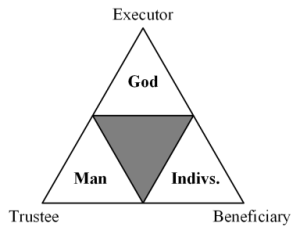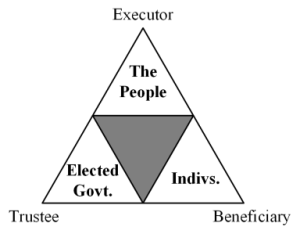It’s time to pull some things together. Our Calling, Status, and Law described the Bible as a trust document, and so it can be considered as such. All trusts have at least three parties; an executor, trustee, and beneficiary. In this case, as God created creation, it all belongs to Him. He is its king, and sovereign over everything He created. He gave Man dominion over the earth and all things on and within it. The earth is therefore still God’s, He just gave Man its use to meet his needs. This makes Man the earth’s steward. He holds it in trust for God until His return. God’s granting dominion to Man was for man’s benefit.
God’s Trust with Man
This set of relationships is the essence of a trust. God granted the use of something He had authority over to another, for them to use for their benefit. This puts God in the role of an executor, Man in the role of trustee, and mankind as the trust’s beneficiary. The diagram below is one way to describe this relationship.[1]
 Several things about this trust. One, God created it with Adam, the first of all mankind. But God made several covenants after man’s expulsion from the Garden. The first with Noah, when God eliminated all life on the earth but that on the ark. A second, with Abram the father of the Jewish and Arabic peoples. And a third with Moses, when God chose the Israelites and led them out of slavery from Egypt.
Several things about this trust. One, God created it with Adam, the first of all mankind. But God made several covenants after man’s expulsion from the Garden. The first with Noah, when God eliminated all life on the earth but that on the ark. A second, with Abram the father of the Jewish and Arabic peoples. And a third with Moses, when God chose the Israelites and led them out of slavery from Egypt.
Two, we could have put the Israelites as the beneficiary, but I believe it is more proper showing the people within the Israelite society as beneficiaries. I think the Israelites also believed this. The Bible contains many genealogies. These link the individuals within Israel’s tribes, clans, and families with God’s promises. Your family mattered in being part of the promise. While there were outsiders grafted into God’s people (such as Ruth), these were the exception rather than the rule. Whether an Israelite received the benefit of God’s promise also depended on each individual’s decisions and actions. This is the choice of life or death Moses laid out for them before they entered the promised land. (Deut. 30:15-9) We see this idea in the New Testament as well. We were once not a people (individuals), but now we are God’s people. (1 Pet. 2:9-10)
A Couple More Things
First, the list of covenants above isn’t exhaustive, it just includes the ones relevant to this topic. But I’ll add one more. Christ’s death, burial, and resurrection; these restored the opportunity for our original relationship with God. This opened the trust once again to all mankind. Accepting God as King, His Son as savior, and committing to serve and follow Him makes us a beneficiary.
Before closing this section, a quick word about rights and law. God formed this trust solely with Man. God made only Man in His image and likeness. This gift defines our nature, relationship with Him, and the rights and duties we have as individuals.[2] They are all part of who we are. God’s law for us derives from these things.[3]
As God is sovereign, and Man created in His image and likeness, we too are sovereign. Just not sovereign in the same way that God is. He is our Creator; we His created. The Bible says Christ is the King of kings (1 Tim. 6:14-6), not a King of slaves. Further, we are a chosen people, a royal priesthood (1 Pet. 2:9-10) Man is sovereign in his own right in regards to the things he possesses—his life, body, family, rights, and possessions among other things.
America’s Government
This last point matters, because if Man is not sovereign, then there is no basis upon which to create governance. But God gave man the power to govern himself when he rejected God’s rule over him. (1 Sam. 8) Further, this governance was to be exercised in a particular way, as outlined in the last article.
Our Founder’s modeled America’s government upon the same Biblical trust model outlined above. It looks like this.

As a People is sovereign, it can delegate a portion of its authority to another. In this case, to an elected government. This is no different from God’s granting dominion of the earth to man. Man just gave dominion to those they elected in certain areas. So within this trust, the People are the executors, the elected government the trustee, and society’s members (in this case, Virginians, New Yorkers, Pennsylvanians, etc.) the trust’s beneficiaries.
This trust is executed for the people’s common good. Something again aligned with Biblical principles. (Isa. 10:1-2) This arrangement is normally set in a social contract. A constitution. In America’s case, we have four documents; the Declaration of Independence, Articles of Confederation, the Constitution (first), and Northwest Ordinance. When the trustee violates the trust’s terms, the executor can dissolve it. As a sovereign, the people do not have to ask permission to act. They rule; not the government because the people created government.
But America didn’t just grant some power to a single government. Instead, it granted some specific powers to three levels of government; federal, state, and local. It further divided the power at each level among legislative, executive, and judicial branches. All designed to limit government power.
Federal Powers
America’s Constitution outlines the federal governance intent to as “form a more perfect Union, establish Justice, insure domestic Tranquility, provide for the common defence, promote the general Welfare, and secure the Blessings of Liberty.”[4]
Article 1, Section 8 of this document grants the legislative branch 18 powers in the areas of war, the courts, infrastructure (post offices and intellectual property), money, financing government, international matters, and governance over the district. That’s it. Some refer to a 19th power within the preamble; providing for the common defense. But this has to do with war. Within Christianity, the only acceptable war is a defensive one fought for the purpose of preserving peace.[5]
Anything beyond those powers was unlawfully obtained and must be taken back by the people. Those were not only never granted to them, but the present government has abused the little dominion they were granted. It’s become unrighteous, and we should have no part with its current course or leadership. (2 Cor. 6:13-5)
As to the States
Our Declaration outlines some ideas about Man’s sovereignty, but most state constitutions are more direct. Their statements support the earlier ideas expressed within this article. Virginia’s constitution is no exception, although I was surprised to see it’s had 8 constitutions in less than 250 years. Most state constitutions have a Bill of Rights type declaration contained within them. Article I of Virginia’s current (and its original) constitutions states, “A declaration of rights made by the good people of Virginia in the exercise of their sovereign powers … That all men are by nature equally free and independent and have certain inherent rights.” Finally, “That all power vested in, and consequently derived from, the people, that magistrates are their trustees and servants, and at all times amenable to them.”[6]
Sovereigns govern themselves, subject to God and the agreements they’ve made with other sovereigns. Government is put into place to enhance society by supporting the common good and promoting justice. But as a created entity, it is subject to the sovereign people’s will. Or it loses dominion.
This is a good place to end. Next time we’ll square up this content with some of the recent articles about government incorporation, and begin to look at where things went wrong. It’s part of our hidden history. Time to shine the light upon it. Until then.
Footnotes:
[1] Hat tip to Miki Klann for the trust diagram structure.
[2] Wolf, Dan, Rights, Virginia Christian Alliance, 2/28/2021, https://vachristian.org/rights/ .
[3] Wolf, Dan, Law …, Virginia Christian Alliance, 3/21/2021, https://vachristian.org/law/ .
[4] Constitution Center, The Constitution of the United States, https://constitutioncenter.org/media/files/constitution.pdf. Accessed 8/2022.
[5] Schaff, Philip, Nicene and Post-Nicene Fathers, Vol. 2, Augustin: City of God, Christian Doctrine, pp407-8, Wm. B. Eerdmans Publishing Company, 1989. Book XIX, Chapter 12.
[6] Library of Virginia, Virginia Constitutions, https://www.lva.virginia.gov/constitutions/. Accessed 8/2022.





